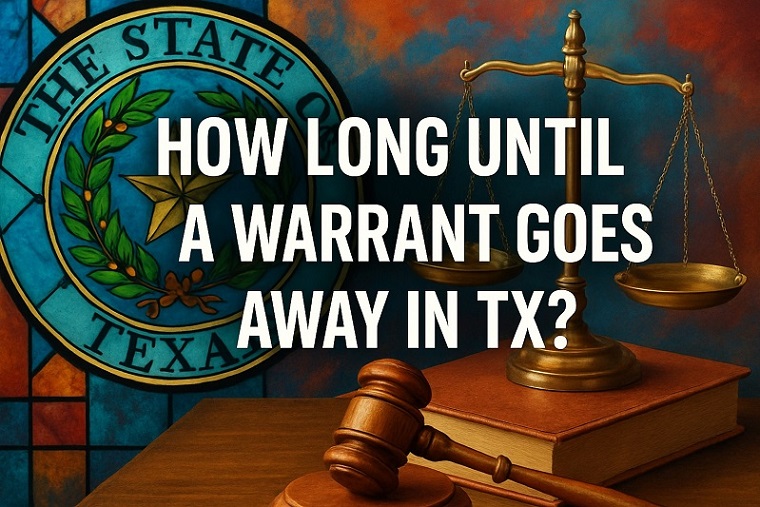If you’ve ever had a warrant issued against you in Texas whether for something as simple as a traffic ticket or a missed court date you may be wondering if it will eventually expire or go away on its own. The short answer is no. Warrants in Texas remain active indefinitely until they are officially resolved by the court. This includes warrants from decades ago, which can still result in arrest or penalties if left unaddressed.
Texas treats all active warrants as open legal matters. The court does not forget about them, nor does time automatically make them disappear. While it’s tempting to ignore a warrant and hope it fades into the background, this strategy can backfire badly especially when trying to renew your driver’s license, apply for a job, or pass a background check. Even a low-level Class C misdemeanor warrant, like one issued for a traffic violation, can disrupt your life in unexpected ways if it’s unresolved.
Many people aren’t aware that warrants can impact more than just the risk of arrest. An active warrant can trigger a license suspension, prevent court processing of other matters, and even interfere with immigration, housing, or employment screenings. Because Texas courts do not impose expiration dates on warrants, the only way to make one go away is to deal with it head-on—either by appearing in court, working with a lawyer, or paying the related fine if allowed.
The good news is that courts generally prefer resolution over punishment. If you’re proactive, there are ways to address a warrant without being arrested, and many courts are willing to work with individuals to clear their record efficiently. Knowing that warrants don’t simply vanish gives you the clarity to take control of the situation rather than waiting for it to spiral further out of reach.
Highlights
Understanding Warrants in Texas
To navigate a warrant properly, it helps to understand the different types issued in Texas and what each one means. While many people use the term “warrant” broadly, Texas law recognizes specific categories—each with its own procedures, risks, and legal implications. The most common types include arrest warrants, bench warrants, and capias pro fine warrants. These can be issued by municipal, justice, or county-level courts depending on the nature of the offense.
An arrest warrant is issued when a law enforcement agency or prosecutor formally accuses someone of a crime, and a judge finds there is probable cause for arrest. A bench warrant, by contrast, is typically issued when someone fails to appear in court after being ordered to do so. These are especially common for unresolved Class C misdemeanors like traffic tickets or public intoxication cases. A capias pro fine warrant is issued after a person has been convicted and fails to pay the court-ordered fine. It’s essentially a warrant for not completing your sentence—and it can also lead to arrest.
The issuing court depends on the level of offense. Municipal courts handle city ordinance and traffic violations. Justice of the Peace (JP) courts often handle similar low-level criminal matters in rural or unincorporated areas. County and district courts typically handle felony-level and higher-class misdemeanor cases. But no matter the court, an issued warrant is enforceable statewide.
A warrant doesn’t mean law enforcement is actively searching for you around the clock—especially for low-level infractions—but it does mean you could be arrested during any routine traffic stop or ID check. That’s why understanding the type and source of your warrant is critical. It determines how you’ll need to resolve it, what risks you face, and how quickly you should act.
Do Warrants in Texas Ever Expire?
 One of the biggest misconceptions about warrants in Texas is that they will simply go away after a certain period of time. Unfortunately, that’s not how the system works. Once a warrant is issued—whether for a missed court appearance, unpaid fine, or failure to comply with a court order—it remains active indefinitely until it is officially resolved or recalled by the issuing court. There is no automatic expiration and no statute of limitations that erases the warrant once it’s been created.
One of the biggest misconceptions about warrants in Texas is that they will simply go away after a certain period of time. Unfortunately, that’s not how the system works. Once a warrant is issued—whether for a missed court appearance, unpaid fine, or failure to comply with a court order—it remains active indefinitely until it is officially resolved or recalled by the issuing court. There is no automatic expiration and no statute of limitations that erases the warrant once it’s been created.
This is particularly important to understand because people often assume that if they stay under the radar long enough, the problem will take care of itself. In Texas, however, courts maintain digital records that stay in law enforcement databases for decades. You might not hear anything about the warrant for years, but it can instantly come back to haunt you during a traffic stop, ID check, background screening, or even when applying for government benefits.
It’s also worth noting that while criminal charges themselves have statutes of limitations, warrants do not. If the court took timely action to issue the warrant before the statute expired, the clock stops. So even if the original offense occurred years ago, the warrant issued in connection with that offense is still valid and enforceable. In other words, time does not heal this legal wound—it only deepens the risk.
The longer you wait to deal with a warrant, the more complications it can create. Courts may tack on additional fees or court costs, and you may lose eligibility for favorable resolutions like deferred disposition or payment plans. That’s why it’s always better to take action sooner rather than later. Resolving a warrant early keeps you in control—and may allow you to resolve the issue without an arrest or court appearance, especially for Class C offenses.
Consequences of an Active Warrant in TX
An active warrant in Texas can do more than put you at risk for arrest—it can quietly disrupt major parts of your life. From your ability to drive legally to passing a job background check, an unresolved warrant acts like a legal anchor. It doesn’t just wait in a file. It follows you. Even if the original issue was minor, such as a traffic citation, the existence of an outstanding warrant signals to courts, law enforcement, and employers that you’ve failed to resolve a legal obligation.
One of the most immediate effects of an active warrant—especially for Class C misdemeanors—is a driver’s license hold. The Texas Department of Public Safety (DPS) can issue an automatic suspension or block renewal until the warrant is cleared. This can prevent you from renewing your license or car registration, and can lead to additional penalties if you’re caught driving with an invalid license. Over time, these secondary violations compound, turning a simple missed court date into a series of escalating legal problems.
Another critical consequence is the risk of arrest during routine encounters with law enforcement. A simple traffic stop or ID check—like trying to enter a courthouse, fly at the airport, or apply for a government program—can flag your warrant. If it’s active, police officers are obligated to detain you, regardless of how minor the original violation was. That means you could be handcuffed, booked, and held until a hearing is scheduled or bond is posted.
And let’s not overlook the long-term damage to your public record and reputation. Warrants are often visible in background checks, which can interfere with job applications, apartment rentals, and even professional licensing. If your warrant is turned over to collections, it could negatively impact your credit score and make financial recovery more difficult. The takeaway is clear: unresolved warrants create a wide web of legal and financial risks, all of which grow worse the longer they remain unaddressed.
How to Clear a Warrant in Texas
The good news is that most warrants—especially those for Class C misdemeanors like traffic tickets—can be resolved without being arrested. The key is to act before the situation escalates. There are several legal paths to clear a warrant in Texas, and the best option depends on the type of warrant, your specific court, and how long it’s been active. Taking initiative not only avoids arrest but may also help you minimize fines, penalties, or even keep the charge off your record.
Option 1: Appear in court voluntarily. Many municipal and justice courts in Texas offer walk-in dockets, which allow you to show up during set hours to address your warrant without an appointment. If you appear voluntarily, judges are often more lenient and may recall the warrant on the spot, reset your case, or allow payment arrangements. You’ll usually need to bring valid ID and be prepared to either plead or request time to consult an attorney.
Option 2: Pay the fine or arrange payment. Some courts allow you to pay outstanding fines online or by phone to clear a warrant—especially for capias pro fine warrants issued after a judgment. Keep in mind that paying the fine is often considered a guilty plea, which results in a conviction. If your goal is to avoid a conviction, it’s better to explore options like deferred disposition or defensive driving first.
Option 3: Hire an attorney. This is often the safest and most efficient option, especially if you have multiple warrants, live out of town, or want to avoid personally appearing in court. A traffic attorney can usually file a motion to recall the warrant, negotiate with the court, and appear on your behalf. In many cases, hiring a lawyer may prevent your arrest entirely and help you qualify for more favorable outcomes, such as a dismissal or record-clearing solution.
No matter which path you choose, time is a factor. Courts tend to offer better options when you’re proactive. The longer a warrant lingers, the more fees, holds, and complications can stack up. If you’re unsure of your eligibility or next steps, contacting the court clerk or consulting a local attorney can provide fast clarity—and peace of mind.
Can a Lawyer Help with a Texas Warrant?
Yes hiring a lawyer can be one of the smartest moves you make if you’re facing an active warrant in Texas. Whether the warrant was issued for a missed court date, unpaid fine, or failure to appear for a minor offense, an experienced attorney can often step in and resolve the issue without you ever needing to enter a courtroom. This is especially useful for people who live out of town, are busy with work or family obligations, or want to avoid the risk of being arrested unexpectedly.
Attorneys can often file a motion to recall or lift the warrant, and request a new court date where they can appear on your behalf. This is common for Class C misdemeanors like traffic tickets, public intoxication, or disorderly conduct. If you’re eligible, they may even negotiate a deal to dismiss the charge through deferred disposition or another court-approved resolution. In cases where a capias pro fine warrant was issued due to unpaid fines, a lawyer can often work out a payment plan or a request to reopen the case.
Lawyers also provide value by protecting your record and rights. For example, paying a fine yourself might lead to a conviction, which shows up on background checks. A lawyer knows how to navigate the system and keep your record clean if possible. They also handle all communications with the court, reducing your risk of missteps or missed deadlines—which could lead to more serious consequences.
While the cost of hiring a lawyer varies depending on the court, complexity, and number of warrants, many offer flat fees for basic warrant resolution services. For people with more at stake such as commercial drivers, licensed professionals, or non-citizens—this investment can be critical. In short, if you’re overwhelmed or unsure of how to proceed, having a lawyer in your corner can help you avoid jail, clear the warrant quickly, and give you a clean path forward.
FAQs About Warrants in Texas
How do I know if I have a warrant in Texas?
You can usually find out by contacting the court that may have issued it, checking the county or city’s online warrant search portal, or calling the clerk’s office directly. Some courts offer online tools where you can search by name or driver’s license number. You can also check with the Texas Department of Public Safety (DPS) for certain types of warrants, especially those related to driver’s license issues.
If you suspect a warrant exists but aren’t sure which court to contact, a local attorney or bail bond company can often check for you discreetly. It’s better to confirm than to wait for an unexpected arrest—especially during a traffic stop or license renewal.
Can I be arrested at work or home for a Texas warrant?
Yes. While most arrests for warrants happen during traffic stops or routine ID checks, it’s legally possible to be arrested at your workplace or home. This is more likely if the warrant is tied to a more serious offense or if you’ve repeatedly ignored court notices.
Even if unlikely, the possibility of being arrested in public or in front of family is stressful and damaging to your reputation. If you believe a warrant may exist, it’s wise to resolve it as soon as possible—often without appearing in person, especially with legal assistance.
How long does it take to remove a warrant from the system?
Once a warrant is resolved—either by payment, court appearance, or attorney action—it can take anywhere from a few hours to a week for the court and law enforcement databases to update. Some smaller courts process warrant recalls the same day, while busier counties may take longer.
During this window, it’s still technically active, so it’s important to carry proof of resolution if you need to interact with police or DPS. A lawyer can often expedite this process or provide documentation confirming that the warrant has been cleared.



